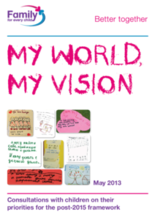The Millennium Development Goals will come to an end in 2015 and discussions are currently taking place on what framework will replace them. Children's participation is crucial to these discussions. Between July 2012 and March 2013, members of Family for Every Child consulted with children living in seven different countries. This report summarizes the main findings that emerged from these consultations and incorporates the views of almost 600 children between the ages of 8 and 17 in Brazil, Ghana, Guyana, India, Kenya, Malawi and Russia. These consultations involved highly vulnerable groups of children, who are commonly marginalized and excluded from policy debates, including children in a range of living arrangements such as extended family care, formal foster care, residential care including short-term shelters for children removed from forced labour or the streets and special residential care facilities for those with disabilities, in child-only households, on the streets, with employers or previously with employers, and in detention.
The children made recommendations on 7 main themes, including wanting to be safe and protected in families and to live free from violence in homes, schools, workplaces and communities. They underlined the importance of governments and others working with families and communities to better understand the needs of children so they can be cared for in supportive and loving homes. Doing so, they argued, would reduce the numbers of children living in institutional care, on the street, in detention and in other environments which are inappropriate for children.
©Family for Every Child

